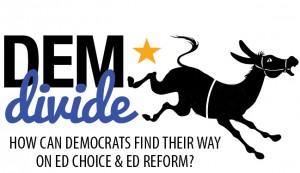The recent ruling in Vergara v. State of California once again highlighted growing tensions in the Democratic Party between two key constituencies: Teachers unions on the one hand; low-income, black and Hispanic families on the other.
 Is there a path to reconciliation? We asked folks who have thought about that a lot. Next week, we’ll run their responses.
Is there a path to reconciliation? We asked folks who have thought about that a lot. Next week, we’ll run their responses.
Here’s the prompt:
In the Vergara decision, Los Angeles Superior Court Judge Rolf Treu took a clear-eyed view of teacher employment policies that too often saddle low-income students with the least effective teachers. “The evidence is compelling,” he wrote. “Indeed, it shocks the conscience.” Yet those policies have long enjoyed full-throated support from teacher unions and their Democratic allies.
A similar rift exists over educational choice. Blacks and Hispanics are embracing charter schools, vouchers, and tax credit scholarships, which parental choice supporters see as expanding opportunity and empowerment of low-income families. But teacher unions, facing loss of market share and political power, are fighting every step of the way.
Democratic lawmakers are increasingly caught in the middle, and increasingly torn. Straddling the divide is becoming more and more difficult as more and more black and Hispanic parents benefit from charters and vouchers – and publicly raise their voices in support.
So, what’s the solution? Can Democrats continue to stiff-arm minority constituencies on ed policy without repercussion? Is there real risk in black and Hispanic voters turning to the more reform-friendly confines of the Republican Party? How long before something gives?
Should/can Democrats write off the teacher unions? Should the ed reform community more actively recruit reform-friendly Democrats for primary challenges? Or should they more aggressively push unions to modify their organizing model to better align with a public education system that is becoming more customized and decentralized?
Read the Dem Divide series below
Gloria Romero: Money leads Democrats to put teachers unions over poor kids
Ben Austin: Democratic leaders will follow parents on ed reform, eventually
Richard Whitmire: Houston & D.C. offer paths for ed reform Democrats
Joe Williams: Suburbs hold key to resolving Dem tensions over school choice
Myles Mendoza: Rahm Emanuel offers lesson for Democrats on ed reform
Rep. Marcus Brandon: African-Americans must blaze own path on school choice, ed reform
Doug Tuthill: New type of teacher union is key to relieving Democratic tensions